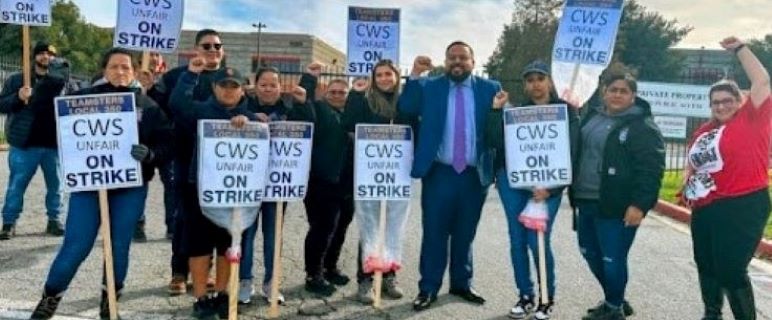Clerical workers at California Waste Solutions (CWS) in San Jose reached a collective bargaining agreement Friday afternoon, ending a six-hour disruption in recycling operations across the city that quickly turned political.
A 10-person clerical unit represented by the Teamsters Local 350 labor union, went on an unfair labor practice (ULP) strike at 4am Friday morning to protest what it characterized as the recycling company’s violations of federal labor law.
California Waste Solutions holds the contract for waste management with the city of San Jose.
Recycling services for many San Jose residents that were shut down Friday will resume Jan. 7, according to the City of San Jose Environmental Services Department.
The strike action caused a “one-day delay in service,” according to a city spokesperson. Residents in single-family dwellings whose collection day was Friday should leave their recycling carts out today until the material is collected. Residents who have junk pickup service scheduled for Friday, should leave their items out to be collected today, said Jenny Loft, Public Information manager for the City of San Jose Environmental Services Department.
Nearly 150 drivers, mechanics and landfill workers at two CWS facilities honored the picket line on Friday, causing major disruptions to recycling services throughout San Jose.
The strike shut down all curbside residential recycle pick-up in San Jose and halted operations at the company’s material recovery facility,” according to the Teamster’s website.
Robert Sandoval, political coordinator for the Teamsters Local 350 labor union, said in a telephone interview that the clerical unit has been “bargaining in good faith” since their labor contract expired in 2021 and are glad both sides were able to come to an agreement.
“The reason for the strike was the company was attempting to remove a side letter in the contract that protected the clerical unit’s work to keep it within the bargaining unit. In addition, the third letter also protected the membership from any unjust layoffs,” said Sandoval.
“We were able to put enough pressure on California Waste Solutions to cave in and have our members keep this worker protection that they already had,” said Sandoval. “This is not a new provision in the contract. This is something that they had in the existing contract, they wanted to maintain, and this is something the employer wanted to remove. However, we were able to modify it to appease and satisfy some of the concerns of the employer. Therefore, we no longer have a strike line, and there's no longer a strike.”
A California Waste Solutions spokesperson downplayed the labor action in a Friday phone call, saying the strike lasted only about 15 minutes this morning at 4am. claiming that it did not involve trash collectors, only people that worked in the office.
Councilman Peter Ortiz, Santa Clara County Supervisor Cindy Chavez, Assemblymen Ash Kalra and Evan Low and State Senator Dave Cortese stopped by the Friday picket line to support the strike..
“I am proud to stand in solidarity” with the workers, Cortese said, according to the Teamsters. Cortese was on the San Jose City Council when Mayor Ron Gonzales cut a union-switch deal that gave the Teamsters the contract to represent trash haulers in San Jose.
Cortese in 2005 had criticized the higher wage contract, saying that Gonzales should issue “a public apology immediately to the entire City Council and the residents of the city of San Jose who are paying for this ... in increased garbage fees.”
Jean Cohen, CEO of the South Bay AFL-CIO Labor Council, said that SBLC endorsed the Jan. 6 strike. “We encourage management to immediately resume negotiations,” the Teamsters quoted her as saying in a statement posted to the union’s website.


!Viva la huelga! Labor unions should be exercising their power to strike on a regular basis to keep the strike muscle healthy and the labor movement vibrant. It is discouraging to see, however, that the union workforce employed by any number of public and private sector entities–including California Waste Solutions–is fragmented into an endless number of small bargaining units. Such a craft union structure allows employers to play some units off against others.
An industrial union structure would unify all workers at any employment site into a single union, like the United Auto Workers, United Steelworkers, the United Mineworkers and the International Association of Machinists and Aerospace Workers were able to achieve in the first half of the 20th century. Such unions on a large scale would be the basis for a labor party, something the U.S. working-class has never been able to achieve, unlike nearly all other working classes in advanced capitalist countries. This is the real “American exceptionalism,” the blot that has destined generations of workers to that status of medieval serfs but with automobiles and mobile phones.